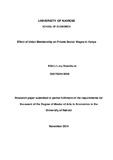| dc.description.abstract | Union membership is one of the indicators of collective bargaining in the labour
market. The trade unions rely on the number of workers they represent during the
bargaining process since it gives them leverage over the employers in pushing for
higher wages and better working conditions for the workers. This research paper
focuses on the effect of union membership on private sector wages in Kenya. There
have been fluctuations in union membership over the years; but there has been a
consistent growth in the negotiated wages. Therefore, the paper sought to determine
whether union membership plays any role in the determination of the private sector
wages.
Using the Generalized Method of Moments (GMM) to estimate the dynamic fourteenyear
panel data of 2000 – 2013 from nine sectors of the Kenyan economy, drawn
from the Ministry of Labour records and other government publications, union
membership was found to have a positive effect of 0.43% on the annual wages of
the private sector. On the other hand, a percentage increase in sectoral productivity
leads to an increase in wages by 0.05% while a percentage increase in the Gross
Domestic Product (GDP) in the country will lead to an increase in annual wages by
0.48%. | en_US |

